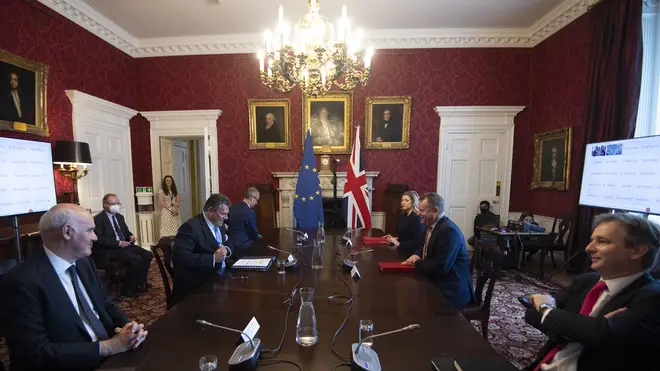
Ali Miraj 12pm - 3pm
9 June 2021, 15:25 | Updated: 9 June 2021, 15:28

There were no major breakthroughs as the UK and European Union continue to row over issues including post-Brexit trade with Northern Ireland.
Brexit minister Lord Frost said the discussions between him and European Commission vice president Maros Sefcovic on the implementation of the Northern Ireland Protocol – which includes controversy over sausages and chilled meats – were “frank and honest” but had concluded with “no breakthroughs”.
"The problem we've got is the protocol is being implemented in a way which is causing disruption in Northern Ireland,” Lord Frost told broadcasters.
However, he said that whilst there were no breakthroughs, he said “there aren’t any breakdowns either” and that talks would continue.
"What we really now need to do is very urgently find some solutions which support the Belfast Good Friday Agreement, support the peace process in Northern Ireland and allow things to return to normal."

'I'd love to move on from Brexit, but the liars are still in charge'
The talks between the vice president and Britain’s Brexit negotiator went on for three and a half hours, and the British Government said it was “concerned” about the lack of “substantive progress” made.
Lord Frost said that the EU wanted to see the Protocol – the area of the Withdrawal Agreement that covers the situation in Northern Ireland – implemented in an “extremely purist way” and said that the “UK will consider all available options”.
He refused to rule out extending the grace period on chilled meat exports, and also said that triggering Article 16 of the Northern Ireland Protocol – a back-up measure should the Protocol cause problems that are likely to affect trade – was something that may be considered.
The grace period is a delay to the new rules being enforced, to allow businesses time to adapt to the changes.

Robert Jenrick blasts the EU over 'unhelpful behaviour'
However, the deputy first minister of Stormont said that progress had been made in some areas, for example the supply of medicines from Great Britain to Northern Ireland.
There is currently the potential for restrictions on the movement of medicines after the grace period ends at the end of 2021, but First Minister Michelle O’Neill said that, despite the fact more work needs to be done, the willingness by all sides to find a solution is “hopeful”.
"We discussed in particular the issue of medicines, which is important that we find a solution there,” said O’Neill.
"And I think all sides are willing to do so and I'd be hopeful that there will be a solution found there, but there still is more work to be done."
Read more: Patients face postcode lottery for cancer treatment with trusts missing targets
Read more: Covid: Passengers on UK cruise ship banned from Scotland due to restrictions
However, O’Neill also acknowledged that a number of other sticking points still remain, saying that the talks were at a “crossroads” and the British Government needed to honour the commitments it agreed to in the Northern Ireland Protocol.
“Certainly there's a frustration that the British Government have signed up to this agreement however they have failed to bring forward ways to implement the Protocol in its entirety,” she said.

Could Eat Out to Help Out make a comeback?
In spite of the ongoing talks about its implementation, Sefcovic said that the UK agreed the Northern Ireland Protocol was the “best solution”.
“Turning to the protocol on Ireland, Northern Ireland, the EU repeated today its unwavering commitment to the Good Friday Belfast Agreement," he told a press conference in London.
"For this, the protocol needs to be implemented.
“The UK agreed to the protocol as being the best solution.
“After four years of intensive negotiations to address the unique situation on the island of Ireland, and the challenges created by Brexit and the UK's choice to leave the EU single market and customs union.
“The EU and the UK agreed that the protocol was the only way to protect the Good Friday Belfast Agreement in all its parts.”